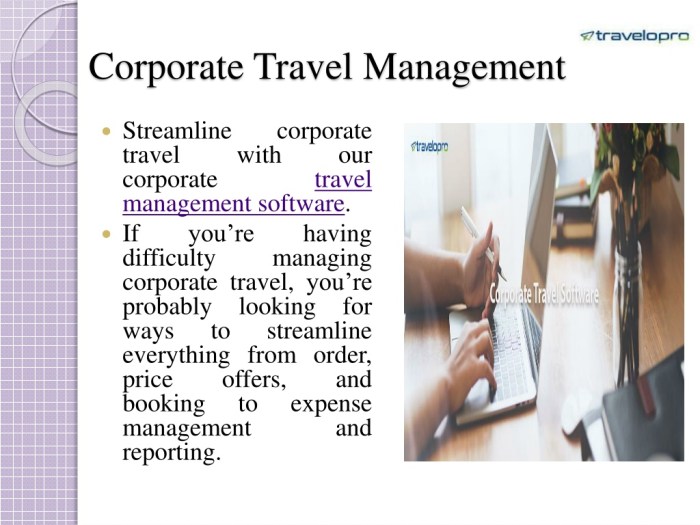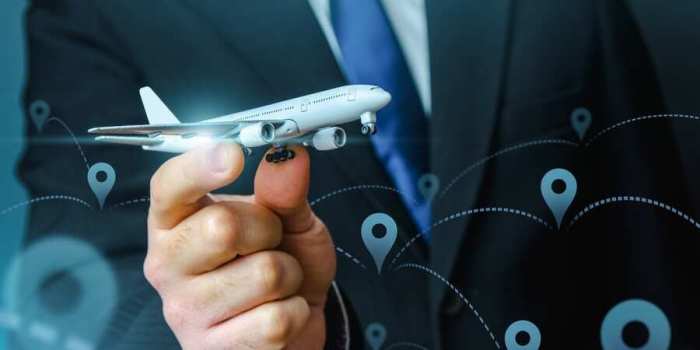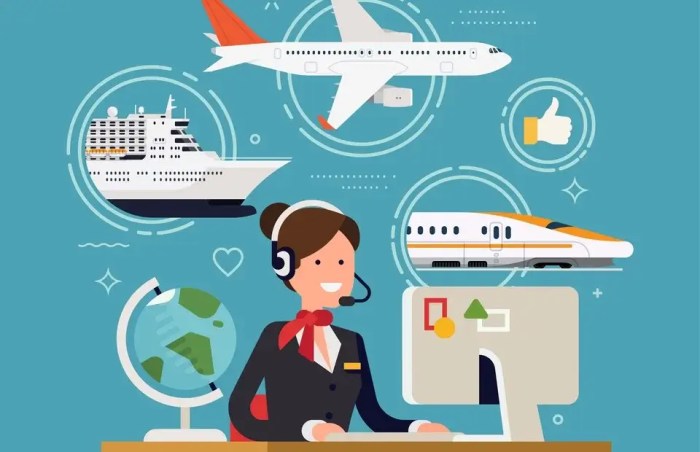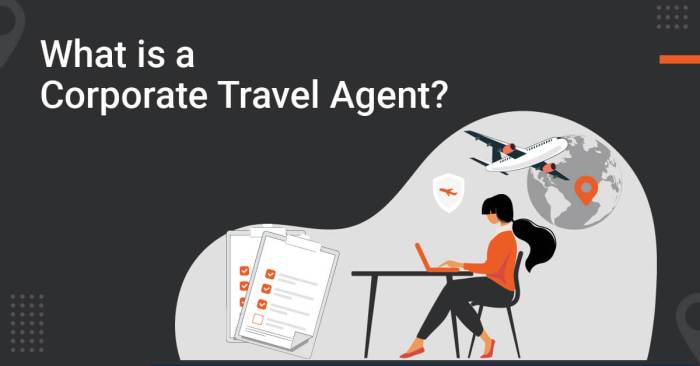Top Business Travel Management Companies A Comprehensive Guide
Top business travel management companies play a crucial role in streamlining corporate travel. From intricate itineraries to cost-effective solutions, these companies are essential partners for businesses navigating the complexities of modern travel. This guide explores the landscape of top-tier travel management companies, highlighting their services, key differentiators, and selection criteria for businesses seeking optimal travel solutions.
The guide will delve into various aspects of choosing a travel management company, including the different types of services offered, evaluation criteria, and emerging trends in the industry. It will cover everything from evaluating pricing models and technologies to understanding performance metrics and case studies. This will equip businesses with the knowledge to make informed decisions about their travel management needs.
Introduction to Business Travel Management Companies
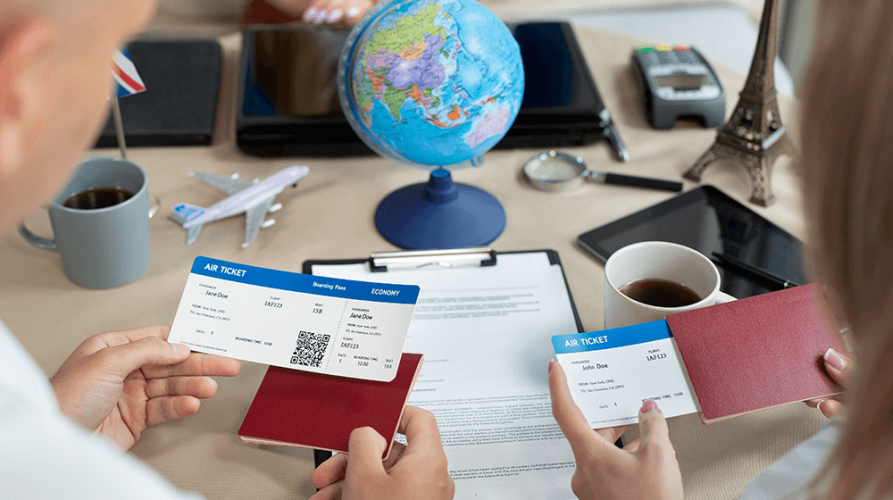
Business travel, a crucial component of modern commerce, often involves complex logistics and significant expenditure. Managing these aspects efficiently and cost-effectively is paramount for businesses of all sizes. Travel management companies (TMCs) play a pivotal role in streamlining this process, offering expertise and technology to optimize travel arrangements and reduce costs.
Overview of the Business Travel Management Industry, Top business travel management companies
The business travel management industry encompasses a wide range of services aimed at facilitating and optimizing business travel for companies. This industry is characterized by a blend of traditional travel agencies and innovative technology platforms, all seeking to provide comprehensive solutions for their clients’ travel needs. The market is constantly evolving, with emerging technologies and changing traveler preferences driving continuous innovation.
Role and Importance of Travel Management Companies (TMCs)
TMCs act as intermediaries between businesses and travel providers. They leverage their expertise to negotiate favorable rates, secure booking options, and manage complex travel itineraries. Their value proposition lies in their ability to streamline the entire travel process, freeing up company resources to focus on core business operations. This frees up internal staff from tedious administrative tasks, reducing errors and enhancing overall efficiency.
Types of Business Travel Management Services
TMCs offer a diverse range of services beyond simply booking flights and hotels. These include:
- Policy Management: TMCs help companies develop and implement comprehensive travel policies to ensure compliance with company guidelines and regulations.
- Expense Reporting: Integrated systems for accurate and efficient expense reporting, often reducing the administrative burden on employees.
- Risk Management: Proactive measures to mitigate potential risks, such as security concerns and unforeseen travel disruptions, are often crucial for global businesses.
- Global Travel Solutions: Expertise in managing complex international travel arrangements, including visa processing, customs requirements, and currency conversions.
- Sustainability Initiatives: Support for eco-conscious travel choices, such as carbon offsetting and using sustainable transportation options, is increasingly important for environmentally conscious businesses.
Examples of Businesses Utilizing TMC Services
Numerous types of businesses utilize TMC services, including:
- Corporations: Large multinational corporations rely on TMCs to manage the travel arrangements for thousands of employees annually, optimizing their travel budgets and ensuring compliance.
- Small and Medium-Sized Enterprises (SMEs): Smaller businesses also benefit from TMC services, enabling them to streamline their travel operations without needing dedicated travel personnel.
- Non-profit Organizations: Non-profits can leverage TMC expertise to optimize travel budgets for conferences, fundraising events, and volunteer trips.
- Government Agencies: Government entities often utilize TMCs to manage the travel needs of their employees and contractors, ensuring compliance with specific regulations.
Key Benefits of Using a Business Travel Management Company
Implementing a TMC can significantly enhance a business’s travel management process, leading to numerous benefits. The following table highlights these key advantages:
| Benefit | Description |
|---|---|
| Reduced Costs | Negotiated rates with travel providers and efficient travel planning can result in significant cost savings. |
| Improved Efficiency | Streamlined processes and automated tools reduce administrative workload and increase operational efficiency. |
| Enhanced Compliance | TMCs ensure compliance with company policies and regulations, minimizing risks and legal issues. |
| Increased Control | Centralized management of travel arrangements provides greater visibility and control over travel expenses. |
| Access to Expertise | Specialized knowledge and experience in travel management solutions can address complex situations effectively. |
Evaluating Top Business Travel Management Companies

Source: planergy.com
A critical aspect of effective business travel management lies in selecting the right provider. Choosing a company that aligns with specific needs and budget considerations is paramount. This evaluation process considers various factors, including service offerings, pricing models, and the technology utilized.
The diverse landscape of business travel management companies presents a variety of solutions tailored to different corporate requirements. Understanding these nuances and how each company approaches these challenges is key to making an informed decision.
Service Offerings Comparison
Different companies excel in various aspects of business travel management. Some specialize in booking flights and hotels, while others provide comprehensive services encompassing ground transportation, visa assistance, and expense reporting. Evaluating the breadth and depth of each company’s service portfolio is essential for matching it to specific business travel requirements.
Key Differentiators
Several factors distinguish top business travel management companies from their competitors. These include specialized expertise in specific industries or geographic regions, a strong focus on cost optimization strategies, and advanced technologies for streamlining travel processes. Companies with these strengths are better positioned to deliver exceptional value and improve the overall travel experience for their clients.
Pricing Models
Companies employ various pricing models. Some use a per-transaction fee, while others offer subscription-based plans with tiered pricing structures dependent on the volume of travel booked. Some may also incorporate a percentage-based commission model. Understanding the intricacies of these models is crucial for accurate budget planning and cost estimation.
Technology Utilization
The level of technological integration within business travel management companies plays a significant role in operational efficiency. Companies with advanced software and online platforms provide tools for booking, expense tracking, and reporting. These technologies also often integrate with existing corporate systems for seamless data flow. The availability of these features can streamline travel processes and improve overall productivity.
Company Feature and Benefit Comparison
| Company | Key Features | Benefits | Pricing Model |
|---|---|---|---|
| Company A | Comprehensive booking platform, integrated expense reporting, customized travel policies, and 24/7 support. | Streamlined travel processes, reduced administrative burden, improved cost control, enhanced employee experience. | Subscription-based, tiered pricing based on volume of travel. |
| Company B | Focus on cost optimization through dynamic pricing, preferred supplier relationships, data-driven analytics, and robust reporting tools. | Significant cost savings, enhanced negotiation power with suppliers, real-time insights into travel spend, and actionable data for future planning. | Combination of per-transaction fees and subscription packages. |
| Company C | Specialized expertise in international travel, global network of suppliers, visa support, secure payment gateways, and multilingual support. | Effortless international travel management, streamlined visa processing, secure transactions, and improved cross-border collaboration. | Per-transaction fees, with volume discounts for frequent travelers. |
Key Criteria for Selection: Top Business Travel Management Companies
Choosing the right business travel management company is crucial for optimizing travel budgets and ensuring smooth operations. A well-selected partner can significantly impact a company’s bottom line and employee satisfaction. This section details the key criteria businesses should consider when evaluating potential providers.
Cost-Effectiveness
Cost-effectiveness is paramount. Businesses must analyze not just the initial quoted price but also the potential for hidden fees, cancellation policies, and the overall value proposition. Negotiating favorable rates and leveraging volume discounts are key strategies to maximizing cost savings. For example, a company with a large travel volume can often secure better rates than a smaller company. Travel managers should also consider the potential long-term cost savings offered by different technologies and reporting capabilities.
Reliability
Reliability encompasses the ability of a travel management company to consistently deliver on its promises. Factors include the timely booking of flights and accommodations, handling of unforeseen circumstances, and adherence to company policies. Robust customer support and efficient communication channels are essential for a reliable partner. A company experiencing frequent disruptions in service or difficulty in handling emergencies is less reliable and more likely to cause problems for the business.
Customer Service
Exceptional customer service is vital for a smooth travel experience for employees. This includes responsiveness to inquiries, proactive assistance with issues, and the overall support offered throughout the travel process. Positive customer service experiences translate into happier employees, reducing stress and enhancing productivity. A well-trained and responsive customer service team can significantly improve employee satisfaction and reduce the likelihood of complaints.
Technological Capabilities
Modern travel management companies leverage advanced technologies for streamlined operations and data analysis. The ability to integrate with existing business systems, offer online booking portals, and provide real-time reporting is essential. These capabilities enable businesses to monitor travel expenses effectively, track employee travel patterns, and optimize overall travel spending. Companies with robust, user-friendly technology will enhance efficiency and empower employees to manage their travel independently.
Global Reach
Global reach is important for companies with international travel needs. A company with a strong global network of agents and partners can facilitate seamless travel arrangements across different time zones and regions. This includes access to a wide range of destinations, competitive pricing, and expertise in international travel regulations. For example, a company with operations in multiple countries can offer better solutions for employees traveling internationally.
Case Studies
Successful partnerships between businesses and travel management companies showcase the tangible benefits of a well-chosen partner. One example is a large corporation that reduced its travel costs by 15% after implementing a new travel management program. Another case involves a company that saw a significant improvement in employee satisfaction due to a streamlined travel booking process.
Comparative Analysis of Selection Criteria
| Criteria | Importance (1-5, 5 being highest) | Example Values |
|---|---|---|
| Cost-Effectiveness | 5 | 10% reduction in average travel cost |
| Reliability | 4 | 99% on-time booking rate |
| Customer Service | 4 | Average response time of 1 hour |
| Technological Capabilities | 3 | Integration with the existing ERP system |
| Global Reach | 3 | Coverage in 150+ countries |
Trends and Future of Business Travel Management

The business travel management landscape is undergoing a rapid transformation, driven by technological advancements, evolving employee expectations, and a growing emphasis on sustainability. Companies are increasingly seeking solutions that optimize travel costs, enhance employee experiences, and align with environmentally conscious practices. This dynamic environment necessitates a forward-thinking approach to travel management, adapting to emerging trends to ensure both operational efficiency and corporate social responsibility.
Emerging Trends Shaping the Industry
The business travel industry is experiencing a confluence of trends, including the rise of dynamic pricing models, the integration of AI and automation, and a renewed focus on employee well-being. These factors are reshaping the way businesses approach travel planning, execution, and reporting.
- Dynamic Pricing Models: Real-time pricing adjustments, influenced by factors like demand and competitor rates, are becoming increasingly prevalent. This necessitates sophisticated algorithms and sophisticated travel management platforms that can optimize travel costs while maintaining flexibility. For example, companies like Booking.com and Expedia leverage vast datasets to adjust pricing in response to various factors, including competitor actions and market fluctuations. This trend is transforming how travel agents and corporations alike manage pricing strategies.
- AI and Automation: Artificial intelligence is automating many aspects of travel management, from itinerary creation to expense reporting. This automation not only reduces administrative burdens but also allows for better data analysis and more informed decision-making. Travel management companies are incorporating AI-powered tools for optimizing flight routes, hotel selections, and expense reporting, freeing up staff for more strategic tasks. For instance, chatbots can assist employees with booking and provide real-time updates on travel policies.
- Employee Well-being and Experience: A focus on employee well-being and positive travel experiences is becoming increasingly important. This includes factors such as offering personalized travel options, providing access to relevant information and support, and ensuring a seamless travel process. Companies are prioritizing employee comfort and safety through initiatives like real-time support during travel, personalized itineraries, and proactive communication.
Technology’s Impact on the Travel Experience
Technology is revolutionizing the way businesses manage and experience travel. From mobile apps for booking and expense tracking to integrated travel management systems, technology is streamlining processes and enhancing efficiency. This leads to a more personalized and seamless travel experience for employees, while simultaneously enabling better cost control for businesses.
- Mobile Travel Management Applications: Mobile apps are transforming how employees book travel, track expenses, and access travel policies. These apps offer convenience and efficiency, allowing employees to manage their travel arrangements on the go while offering businesses greater visibility and control.
- Integrated Travel Management Systems: Integrated travel management systems (TMS) are streamlining the entire travel process, from booking to reporting. These systems provide comprehensive data and analytics to optimize travel spend and improve operational efficiency. This facilitates better control over travel budgets and provides valuable insights into travel patterns and preferences.
- Data Analytics and Reporting: Advanced analytics are enabling businesses to gain deeper insights into their travel spending patterns, identify areas for optimization, and make data-driven decisions. This trend allows for proactive adjustments and better control over travel costs.
Sustainable Travel Practices
Environmental consciousness is significantly influencing the business travel industry. Companies are increasingly incorporating sustainable travel practices into their travel policies, seeking ways to reduce their environmental footprint. This involves choosing eco-friendly accommodations, opting for public transportation or electric vehicles, and minimizing travel whenever possible.
| Trend | Potential Impact on the Industry |
|---|---|
| Sustainable Travel Practices | Reduced environmental impact, improved corporate image, potential cost savings through reduced carbon emissions, and compliance with environmental regulations. |
| AI and Automation | Improved efficiency, reduced administrative burdens, enhanced data analysis, and potentially reduced costs. |
| Employee Well-being and Experience | Increased employee satisfaction, improved productivity, reduced stress related to travel, and a more positive corporate image. |
Analyzing Company Performance

Evaluating business travel management companies (TMCs) requires a deep dive into their performance metrics. Beyond simply comparing prices, a thorough analysis considers factors like booking accuracy, cost savings, and the overall return on investment (ROI) for the client. Understanding these aspects allows for a more informed decision when choosing a TMC.
Key Performance Indicators (KPIs)
Several KPIs are critical for assessing a TMC’s effectiveness. These indicators provide a comprehensive view of their operational efficiency and value proposition. Careful consideration of these factors is vital for identifying the best fit for a company’s travel needs.
- Booking Accuracy: This metric measures the percentage of bookings processed correctly, reflecting the TMC’s proficiency in managing details like dates, destinations, and passenger information. High accuracy minimizes errors and associated costs.
- Cost Savings: A crucial factor, this KPI reflects the ability of the TMC to secure favorable rates and negotiate discounts on travel arrangements. It is calculated by comparing the total costs of travel managed by the TMC versus the anticipated costs without the TMC.
- Negotiated Rates: The TMC’s ability to secure favorable rates through negotiated contracts with airlines, hotels, and other travel providers significantly impacts cost savings. Successful negotiation translates to better deals for the client.
- Reporting and Transparency: A TMC’s reporting capabilities are essential. Clear, detailed, and timely reports on expenses, savings, and other relevant data provide a transparent view of the managed travel program.
- Service Level Agreements (SLAs): These agreements establish performance expectations, outlining response times to inquiries, resolution of issues, and other service guarantees. Understanding the SLA framework is crucial to assessing reliability.
Measuring Return on Investment (ROI)
Calculating the ROI of using a TMC involves comparing the benefits derived from the TMC’s services to the costs associated with employing it.
ROI = (Benefits – Costs) / Costs
The benefits can encompass cost savings, time savings, reduced administrative burden, and improved compliance. Costs include the TMC’s fees, potentially including technology implementation and training.
Comparative Performance Analysis
Illustrative data, represented in a table, can be used to compare the performance of different TMCs.
| TMC | Booking Accuracy (%) | Cost Savings (%) | Average Response Time (Days) |
|---|---|---|---|
| Company A | 98.5 | 12.2 | 1.5 |
| Company B | 97.8 | 10.5 | 2.0 |
| Company C | 99.0 | 15.0 | 1.0 |
The table displays hypothetical data for three different TMCs. Company C exhibits the highest booking accuracy and cost savings, while Company A offers the quickest response time. This simplified comparison underscores the importance of multiple criteria for a thorough assessment.
A bar chart could visually compare cost savings percentages across the different TMCs. A separate line graph could plot the booking accuracy of each company over a specified period, showing any trends in their performance.
Importance of Factors
Booking accuracy is critical for avoiding costly errors and ensuring smooth travel arrangements. Cost savings are essential for optimizing travel budgets and achieving financial efficiency. By carefully measuring and evaluating these factors, companies can make well-informed decisions that maximize the benefits of utilizing a TMC.
Case Studies and Examples
A crucial aspect of understanding business travel management is examining how companies have successfully implemented strategies and leveraged technology to optimize their travel programs. Real-world case studies provide valuable insights into best practices and highlight the tangible benefits of using travel management companies (TMCs). Analyzing these examples allows us to better grasp the potential for efficiency gains, cost savings, and policy improvements within various organizational contexts.
Successful Business Travel Management Strategies
Various strategies have proven effective in enhancing business travel programs. These often involve a combination of factors, including meticulous policy development, robust technology implementation, and diligent supplier management. A strong TMC partnership can be instrumental in streamlining these processes.
- Company X: This company implemented a comprehensive travel policy that prioritized sustainability and cost-effectiveness. They partnered with a TMC specializing in eco-friendly travel options, resulting in a 15% reduction in carbon emissions and a 10% decrease in overall travel costs. This demonstrates the potential of integrating sustainability into travel policies.
- Company Y: Facing rising airfare costs, Company Y leveraged its TMC’s negotiation power to secure better rates on flights and hotels. By implementing a dynamic pricing strategy, they were able to significantly reduce travel expenditures, demonstrating how TMCs can negotiate favorable contracts.
- Company Z: This company adopted a mobile-first approach to its travel policy, empowering employees to book and manage trips through a dedicated mobile application. This streamlined the booking process, reduced manual effort, and enabled real-time tracking of travel expenses. This highlights the effectiveness of technology integration in enhancing travel management efficiency.
Adapting Travel Policies Based on TMC Use
The utilization of TMC services often necessitates adjustments to existing travel policies. These changes can streamline processes, improve transparency, and enhance compliance. The shift toward a more centralized and managed travel program frequently leads to enhanced cost control and greater accountability.
- Policy Refinement: Companies often refine their travel policies to align with TMC capabilities and best practices. This might involve standardizing booking procedures, implementing pre-approved vendor lists, or setting clear guidelines for expense reporting. This allows for greater control and consistency in travel management.
- Expense Reporting Simplification: A well-implemented TMC system often leads to a more streamlined expense reporting process. Automated expense reporting tools and digital receipts significantly reduce the administrative burden on both employees and finance departments. This translates into significant time savings and a reduction in errors.
Leveraging TMC Services for Efficiency and Cost Savings
TMCs provide access to a network of suppliers, allowing for competitive pricing and efficient travel arrangements. Their expertise in negotiation and vendor management can yield substantial cost savings.
- Negotiated Rates: TMCs frequently negotiate favorable rates with airlines, hotels, and other travel providers, leading to cost savings for their clients. This collaborative effort can significantly reduce the overall cost of travel.
- Automated Processes: TMCs offer automated booking and expense reporting tools, streamlining the entire travel process. These tools reduce manual effort, minimize errors, and improve overall efficiency. This contributes to a more effective and streamlined travel management system.
Different Ways Companies Use TMC Services
The applications of TMC services extend beyond basic travel arrangements. Many companies leverage TMC expertise for specialized needs.
- Event Management: Some TMCs manage complex event travel needs, including arranging accommodations, transportation, and other logistics for conferences and meetings. This frees up internal resources for other critical tasks.
- Global Travel: TMCs specializing in global travel provide comprehensive solutions for international business trips, ensuring compliance with local regulations and customs procedures.
Summary of Case Studies
| Company | Strategy | Results |
|---|---|---|
| Company X | Sustainable travel policy & eco-friendly TMC | 15% reduction in carbon emissions, 10% cost reduction |
| Company Y | Dynamic pricing & TMC negotiation | Significant reduction in travel expenditures |
| Company Z | Mobile-first travel policy & technology integration | Streamlined booking, reduced manual effort |
Conclusive Thoughts
In conclusion, selecting the right business travel management company is a strategic decision that can significantly impact a company’s bottom line and operational efficiency. This guide has provided a comprehensive overview of the top companies, their offerings, and critical selection criteria. By understanding the evolving trends and performance metrics, businesses can confidently partner with a travel management company to optimize their travel programs and achieve greater cost savings and operational efficiency. The future of business travel is intertwined with the evolution of travel management companies, and this guide provides a clear roadmap for businesses seeking to navigate this evolving landscape.
